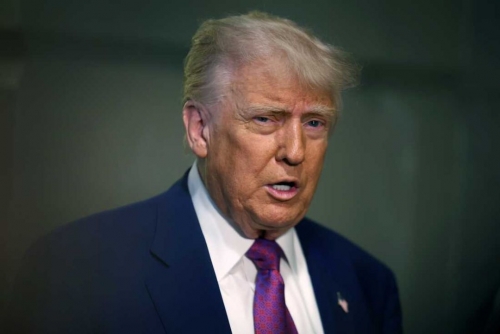Trump Reinstates Travel Ban on Nationals from 12 Countries
TDT | Manama
Email: mail@newsofbahrain.com
U.S. President Donald Trump has signed a sweeping executive order banning travel to the United States from nationals of 12 countries, citing national security risks. The measure, announced by the White House, marks the second time Trump has enacted such restrictions during his presidency.
According to the proclamation, an additional seven countries will be subject to partial travel restrictions. The new order is set to take effect at 12:01 a.m. on Monday and will be reviewed periodically. No specific end date has been given.
Countries Affected by the Ban
The 12 countries facing full travel bans include:
-
Afghanistan
-
Myanmar
-
Chad
-
Republic of the Congo
-
Equatorial Guinea
-
Eritrea
-
Haiti
-
Iran
-
Libya
-
Somalia
-
Sudan
-
Yemen
Seven other countries will face partial restrictions:
-
Burundi
-
Cuba
-
Laos
-
Sierra Leone
-
Togo
-
Turkmenistan
-
Venezuela
Security Justifications and Context
The White House stated the bans are “common-sense restrictions” intended to protect Americans from “dangerous foreign actors.” The move comes just days after an alleged terrorist attack in Boulder, Colorado, where an Egyptian national injured 12 people during a rally in support of Israeli hostages.
In a video posted to his Truth Social platform, Trump said the attack underscored the threat posed by individuals who had not been “properly vetted.” Notably, Egypt is not among the countries listed in the new order. Trump has previously described Egyptian President Abdel Fattah al-Sisi as his “favourite dictator.”
Exemptions
The order includes specific exemptions for certain individuals, including:
-
Athletes participating in major international sporting events such as the 2026 FIFA World Cup and the 2028 Olympic Games
-
Holders of immigrant visas from ethnic or religious minority groups facing persecution in Iran
-
Afghan nationals with Special Immigrant Visas
-
Lawful U.S. permanent residents
-
Dual nationals with citizenship in a non-listed country
In addition, the Secretary of State may approve individual exemptions on a case-by-case basis if deemed in the national interest.
Reactions and Legal Outlook
The order has sparked swift criticism both domestically and internationally.
Somalia’s ambassador to the U.S., Dahir Hassan Abdi, reaffirmed his country’s commitment to collaborating with the U.S. on security matters. Meanwhile, Venezuela’s Interior Minister, Diosdado Cabello, warned that “being in the United States is a great risk for anyone, not just for Venezuelans.”
U.S. Democrats also strongly condemned the decision. Rep. Pramila Jayapal (D-WA) called it “an expansion of Trump’s Muslim ban” that further isolates the U.S. on the global stage. Rep. Don Beyer (D-VA) accused Trump of betraying the ideals of America’s founders.
Human rights organizations echoed these concerns. Amnesty International USA labeled the move “discriminatory, racist, and downright cruel,” while Human Rights First called it “another anti-immigrant and punitive action.”
A Familiar Policy Revived
Trump’s original travel ban, issued in 2017, targeted several Muslim-majority countries and faced immediate legal challenges. After a series of revisions—including the addition of non-Muslim-majority nations such as North Korea and Venezuela—the ban was upheld by the U.S. Supreme Court in 2018.
Former President Joe Biden rescinded the ban in 2021, referring to it as “a stain on our national conscience.”
Trump’s new order, while likely to face legal scrutiny, signals a return to one of the most controversial policies of his first term as he seeks re-election.
Related Posts

